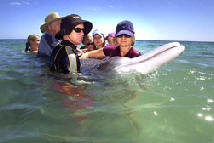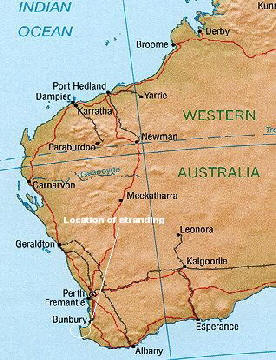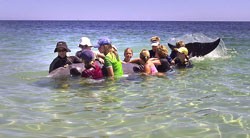|
CALM recreational planner Neil Taylor said it was
the biggest whale stranding seen in the area.
He was confident the whales would stay clear of the
shore once they were returned to deeper water and
he hoped the breakaway whale would follow the pod
out to sea.
CALM staff supervising the operation were
astounded at the number of people who volunteered
to help.
An estimated 2000 people turned up throughout the day.
"We have had a queue like going into a premiere of a movie for people registering to go out there and help with the managing of the animals," Mr Taylor said.
Mandalay Holiday Resort owner Clive Johnson, whose caravan park overlooks the stranding site, said the whales were hardly ever seen in the area.
"I have lived on the caravan park for 39 years and this is the first time this has happened here and only the second time we have seen them here," he said.
Dick Keyser was spending a relaxing holiday in
Busselton one minute and the next was waist-deep
in water helping to keep a whale alive.
"I was out there for an hour and a half, with 10 to
14 people, hanging on to one of them, he said.
"It is the first time I have been involved in anything
like this."
Marine mammal researcher Nick Gales said Gray's beaked whales were extremely social animals adapted to living offshore and these characteristics could have lead to the stranding.
"(In shallow water) they simply get confused about where they are because they live most of their lives in deep water," he said.
Dr Gales said their strong social bonds, essential in a deep-water existence, would have lead to one animal bringing the rest of the pod into the shallow water.
The last reported stranding of a Gray's beaked whale was in January last year when one was found washed up on Leighton Beach and two were reported stranded near Albany a few days before.
Follow up report - 16th January 2003
|


